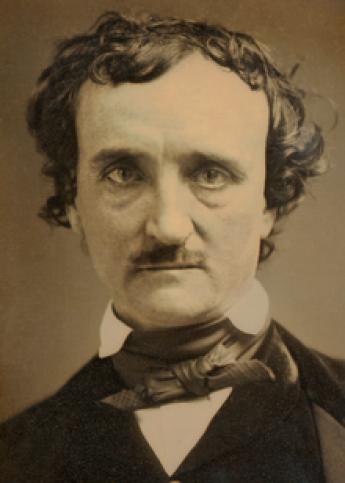Antiquarian Booksellers' Association Simon Beattie Ltd
Collecting - The Russian taste for Edgar Allan Poe

By Simon Beattie
‘”Edgar Poe - the underground stream in Russia.” So the Russian Symbolist poet Aleksandr Blok noted in his journal for November 6, 1911, a topic for a future critical study. The article was never written, but the prospect has remained an enticing one. For Poe’s fame, however clouded by conflicting interpretation, is of long standing in Russia’ (Joan Delaney Grossman, Edgar Allan Poe in Russia: a study in legend and literary influence, p. 7).
In fact, Russian interest in the works of Poe (1809–1849) actually began while the great American author was still alive. His first appearance in the language was in 1847, when a translation of his prize-winning story The Gold-Bug (1843) was published in Moscow, alongside an article on the moon and another about a journey to the Harz Mountains, in the first number of Pyotr Redkin’s short-lived Novaia biblioteka dlia vospitaniia (‘The New Library for Education’), a journal for young people and their teachers.
The translation was done, as was the case with many Russian translations of the period, via French (from Alphonse Borghers’ Le Scarabée d’or of 1845). ‘Where the Russian differs markedly from the French as well as the English, the changes seem to have been dictated by the youth of the audience for whom it was prepared. Despite its short life [it only ran for two years], the New Library was of decidedly high caliber, apparently aimed at systematically exposing its young readers to varied cultural experiences’ (Grossman, p. 25).
Further translations in various literary journals followed throughout the second half of the nineteenth century. Then, in 1895, the poet Konstantin Balmont published two important translations: Ballady i fantazii (‘Ballads and fantasies’) and Tainstvennye rasskazy (‘Tales of Mystery’).
‘The appearance of the two Balmont volumes was probably the most significant single event in the whole course of Poe’s fame in Russia. It was also an event for the budding Russian Symbolist movement. Over the next decade or more Balmont came close to duplicating in Russian Baudelaire’s services towards Poe … The new translations were both symptom and cause of increased interest in Poe. Balmont’s two volumes offered a wider selections than any yet known in Russia. Their quality, in comparison to what had been known before, was of the highest …’ (Grossman, pp. 72–3). In the Ballady, Balmont translated a number of the poems for the first time, among them ‘The Bells’. It was this version which Rachmaninov used as the basis for his great choral symphony in 1913.
***
Posted on Simon Beattie's blog "The Books You Never Knew You Wanted", presented here by permission of the author. Pictures: Simon Beattie.
Do you collect the works of Edgar Allen Poe?
> Browse the ILAB Metasearch and find lots of rare and fine editions.
